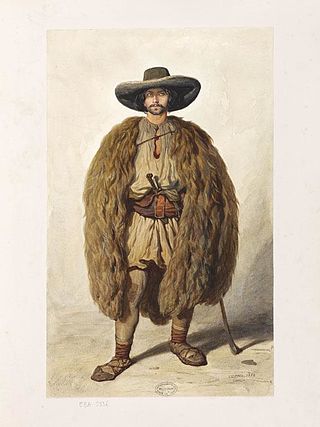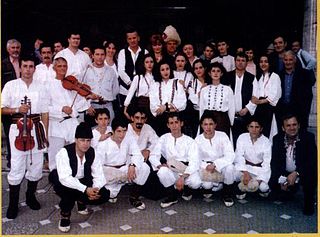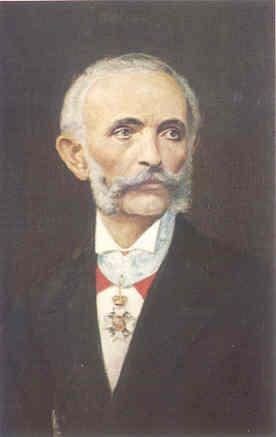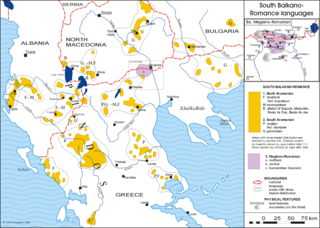
Vlach, also Wallachian, is a term and exonym used from the Middle Ages until the Modern Era to designate speakers of Eastern Romance languages living in Southeast Europe—south of the Danube and north of the Danube.

Romanians are a Romance-speaking ethnic group and nation native to Central, Eastern and Southeastern Europe. Sharing a common culture and ancestry, they speak the Romanian language and live primarily in Romania and Moldova. The 2021 Romanian census found that 89.3% of Romania's citizens identified themselves as ethnic Romanians.

The Aromanians are an ethnic group native to the southern Balkans who speak Aromanian, an Eastern Romance language. They traditionally live in central and southern Albania, south-western Bulgaria, northern and central Greece and North Macedonia, and can currently be found in central and southern Albania, south-western Bulgaria, south-western and eastern North Macedonia, northern and central Greece, southern Serbia and south-eastern Romania. An Aromanian diaspora living outside these places also exists. The Aromanians are known by several other names, such as "Vlachs" or "Macedo-Romanians".
Several theories, in great extent mutually exclusive, address the issue of the origin of the Romanians. The Romanian language descends from the Vulgar Latin dialects spoken in the Roman provinces north of the "Jireček Line" in Late Antiquity. The theory of Daco-Roman continuity argues that the Romanians are mainly descended from the Daco-Romans, a people developing through the cohabitation of the native Dacians and the Roman colonists in the province of Dacia Traiana north of the river Danube. The competing immigrationist theory states that the Romanians' ethnogenesis commenced in the provinces south of the river with Romanized local populations spreading through mountain refuges, both south to Greece and north through the Carpathian Mountains. Other theories state that the Romanized local populations were present over a wide area on both sides of the Danube and the river itself did not constitute an obstacle to permanent exchanges in both directions; according to the "admigration" theory, migrations from the Balkan Peninsula to the lands north of the Danube contributed to the survival of the Romance-speaking population in these territories.

The Asen dynasty founded and ruled a medieval Bulgarian state, called in modern historiography the Second Bulgarian Empire, between 1185 and 1280.

Great Vlachia or Great Wallachia, also simply known as Vlachia, was a province and region in southeastern Thessaly in the late 12th century, and was used to denote the entire region of Thessaly in the 13th and 14th centuries. The name derives from the Vlachs (Aromanians), who had lived across much of the area.

Moravian Wallachia is a mountainous ethnoregion located in the easternmost part of Moravia in the Czech Republic, near the Slovak border, roughly centered on the cities Vsetín, Valašské Meziříčí and Rožnov pod Radhoštěm. The name Wallachia used to be applied to all the highlands of Moravia and the neighboring Silesia, although in the 19th century a smaller area came to be defined as ethno-cultural Moravian Wallachia. The traditional dialect represents a mixture of elements from the Czech and Slovak languages, and has a distinct lexicon of Romanian origin relating to the pastoral economy of the highlands. The name originated from the term "Vlach", the exonym of Romanians.

Romanians in Serbia are a recognized national minority in Serbia. The total number of self-declared Romanians according to the 2022 census was 23,044, while 21,013 people declared themselves Vlachs; there are differing views among some of the Vlachs over whether they should be regarded as Romanians or as members of a distinctive nationality. Declared Romanians are mostly concentrated in Banat, in Vojvodina, while declared Vlachs are mostly concentrated in the Timok Valley, in eastern Serbia.

The Vlachs are a Romanian-speaking population group living in eastern Serbia, mainly within the Timok Valley. They are characterized by a culture that has preserved archaic and ancient elements in matters such as language or customs. Their ethnic affiliation is highly disputed, with some considering the Vlachs as an independent ethnic group while others consider them part of the Romanians.
There are several names of the Aromanians used throughout the Balkans, both autonyms and exonyms.

Konstantinos Zappas was a Greek entrepreneur and national benefactor who together with his cousin, Evangelos Zappas, played an essential role in the revival of the Olympic Games.

The Aromanian language, also known as Vlach or Macedo-Romanian, is an Eastern Romance language, similar to Megleno-Romanian, Istro-Romanian and Romanian, spoken in Southeastern Europe. Its speakers are called Aromanians or Vlachs.
Names of the Serbs and Serbia are terms and other designations referring to general terminology and nomenclature on the Serbs and Serbia. Throughout history, various endonyms and exonyms have been used in reference to ethnic Serbs and their lands. Basic terms, used in Serbian language, were introduced via classical languages into other languages, including English. The process of interlingual transmission began during the early medieval period, and continued up to the modern times, being finalized in major international languages at the beginning of the 20th century.
Statuta Valachorum was a decree issued by Emperor Ferdinand II of the Habsburg monarchy on 5 October 1630 that defined the rights of "Vlachs" in the Military Frontier, in a way that it placed them under direct rule by Vienna, removing the jurisdiction of the Croatian parliament. This was one of three major laws enacted in the early 17th century on the taxation and tenancy rights of the Vlachs, together with the earlier 1608 decree by Emperor Rudolf II and a 1627 decree by Ferdinand.
The term Vlachs was initially used in medieval Croatian and Venetian history for a Romance-speaking pastoralist community, called "Vlachs" and "Morlachs", inhabiting the mountains and lands of the Croatian Kingdom and the Republic of Venice from the early 14th century. By the end of the 15th century they were highly assimilated with the Slavs and lost their language or were at least bilingual, while some communities managed to preserve and continue to speak their language (Istro-Romanians).
Bolokhovians, Bolokhoveni, also Bolokhovens, were a 13th-century ethnic group that resided in the vicinity of the Rus' principalities of Halych, Volhynia and Kiev, in the territory known as the "Bolokhovian Land" centered at the city of Bolokhov or Bolokhovo. Their ethnic identity is uncertain; although Romanian scholars, basing on their ethnonym identify them as Romanians, archeological evidence and the Hypatian Chronicle suggest that they were a Slavic people. Their princes, or knyazes, were in constant conflict with Daniel of Galicia, Prince of Halych and Volhynia, between 1231 and 1257. After the Mongols sacked Kiev in 1240, the Bolokhovians supplied them with troops, but the Bolokhovian princes fled to Poland. The Bolokhovians disappeared after Daniel defeated them in 1257.

The Vlach Church is a Serbian Orthodox church built in 1450 in the village of Donji Kraj, on the Cetinje field, at that time part of Zeta.

Mali Vlaj is a village on the Jablanica Mountain in the municipality of Struga, North Macedonia.
Vlach is a Czech surname, a reference to Vlachs. Notable people with this surname include:
The Aromanian question, also sometimes known as the "Vlach question", refers to the historical and current division of the ethnic identity of the Aromanians, mostly with ones being pro-Greek, pro-Romanian or self-identified purely or primarily as Aromanian.











